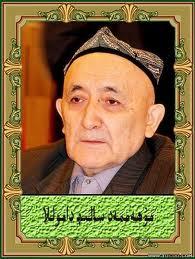Uyghur Human Rights Project expresses concern over possible detention of Uyghur religious leader and scholar Muhammad Salih Hajim

For immediate Release
January 24, 2018, 12:40 pm EST
Contact: Uyghur Human Rights Project +1 (202) 478 1920
The Uyghur Human Rights Project (UHRP) calls on the Chinese government to disclose the whereabouts and condition of Uyghur religious leader and scholar Muhammad Salih Hajim, who was detained approximately 40 days ago in Urumchi along with some of his relatives according to unconfirmed reports.
UHRP asks the Chinese authorities to reveal if Muhammad Salih Hajim and any of his relatives have been charged with a crime. Furthermore, UHRP urges members of the international community to seek information on the welfare of Muhammad Salih Hajim and his family.
“Muhammad Salih Hajim is a respected individual among Uyghurs. He worked with the permission of the Chinese government on a translation of the Holy Quran into the Uyghur language. The work was printed by Chinese government publishers in 1986. The news of his possible detention has shocked the Uyghur community because it is widely believed he would be spared the crackdown on Uyghur religious belief and practice,” said UHRP Director, Omer Kanat in a statement.
Mr. Kanat added: “We call on the Chinese government to confirm the detention of Muhammad Salih Hajim and disclose his alleged crimes. The international community should also seek clarification from Chinese officials about his condition.”
News of Muhammad Salih Hajim’s detention has circulated Uyghur diaspora networks without an official statement from the Chinese government. UHRP is concerned about the health of 82-year-old Muhammad Salih Hajim, who was born in 1936 in Artush, East Turkestan. Information (in Uyghur) on his extensive contributions to the Xinjiang Academy of Social Sciences is available here.
The possible detention of Muhammad Salih Hajim occurs within an ongoing government crackdown on religious belief and practice among Uyghurs. Measures include restrictions placed on students, teachers and government workers observing Ramadan; denial of marriage applications, refusal of service on public transport and evictions based on adherence to the Islamic faith, and a ban on using the traditional Muslim greeting of “As-Salaam Alaikum” in regional schools. There have been reports that Qurans published before 2012 are being confiscated, meaning copies of Salih’s translation may no longer be legal. Recently there have been widespread reports of Uyghurs being detained in large numbers, including high-profile community members such as academics, businessmen and musicians.
Uyghur individuals Hebibulla Tohti, Abdukiram Abduveli, Qamber Amber, Eli Yasin, Eziz Emet, and Horigul Nasir were all convicted and imprisoned for their religious beliefs.
